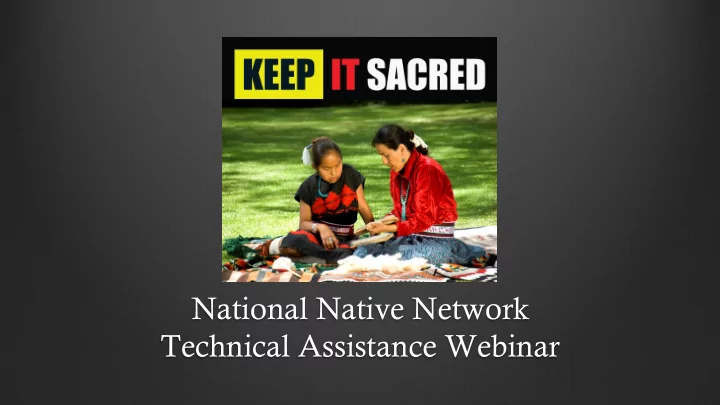

National Native Network Technical Assistance Webinar
Tribal Food Access Collaborative Presented by: Michelle Schulte, MA Project Coordinator Inter-Tribal Council of Michigan, Inc. Masters of Arts – Integrated Marketing • Communication - Emerson College, Boston, Massachusetts – 2006 Bachelor of Arts – Communication & • Journalism – University of New Mexico, Albuquerque, New Mexico - 2004
Tribal Food Access Collaborative Michelle is of mixed ancestry and member of Red Cliff Band of Lake Superior Chippewas. She is a life-long learner having worked in both the health and education fields. A large part of her career has been developing programs (inception-implementation- evaluation). Michelle’s efforts as a project director at Inter-Tribal Council of Michigan include work with tribal communities in Michigan to increase collective impact in early childhood systems and food access requiring strong communication and awareness.
Faculty Disclosure Statement • As a provider accredited by ACCME, ANCC, and ACPE, the IHS Clinical Support Center must ensure balance, independence, objectivity, and scientific rigor in its educational activities. Course directors/coordinators, planning committee members, faculty, reviewers and all others who are in a position to control the content of this educational activity are required to disclose all relevant financial relationships with any commercial interest related to the subject matter of the educational activity. Safeguards against commercial bias have been put in place. Faculty will also disclose any off-label and/or investigational use of pharmaceuticals or instruments discussed in their presentation. All those who are in a position to control the content of this educational activity have completed the disclosure process and have indicated that they do not have any significant financial relationships or affiliations with any manufacturers or commercial products to disclose.
Faculty Disclosure Statement • Funding for this webinar was made possible by the Centers for Disease Control and Prevention DP13-1314 Consortium of National Networks to Impact Populations Experiencing Tobacco-Related and Cancer Health Disparities grant. Webinar contents do not necessarily represent the official views of the Centers for Disease Control and Prevention. • No commercial interest support was used to fund this activity.
Accreditation The Indian Health Service Clinical Support Center is accredited as a provider of continuing nursing education by the American Nurses Credentialing Center’s Commission on Accreditation. This activity is designated 1.0 contact hour for nurses.
CE Evaluation and Certificate § Continuing Education guidelines require that the attendance of all who participate be properly documented. § To obtain a certificate of continuing education, you must be registered for the course, participate in the webinar in its entirety and submit a completed post- webinar survey. § The post-webinar survey will be emailed to you after the completion of the course. § Certificates will be mailed to participants within four weeks by the Indian Health Service Clinical Support Center.
Learning Objectives/Outcomes By the end of this webinar, participants will be able to: 1. Recognize the limited access to safe, nutritious food within American Indian/Alaska Native Communities. 2. Build tribal and non-tribal coalitions focused on increasing community resources that promote healthy nutrition and lifestyle
1. Recognize the limited access to safe, nutritious food within American Indian/Alaska Native communities. 2. Build tribal and non-tribal coalitions focused on increasing community resources that promote healthy nutrition and lifestyle.
www.itcmi.org
´ Ov Overall l goals ls: : Ad Addre ress he health h disparities such uch as nutrition nut n and nd ov overweight/obesity. Focusing on on Native Michi higan n Tribal Food Access Am America can n families with h chi childre ren n aged 3-11 11 Collab Col abor orat ative ´ 1) B ) Build a and st strengthen t tri ribal wo work rkforce ce ca capaci city Fund unded by Michi higan n Health h End ndowment nt Fund und ´ 2) 2) Improve coordination of care between the providers an and nutrit ition educat ation professional als ´ 3) 3) Utiliza zation of community food access points and cu culturally a adapted n nutrition e educa cation r resource ces
Collaboration Builds Collective Impact
Lessons regarding collaboration from TELI (Tribal Early Learning Initiative) and the Tamarack Institute (TA), 2017
Lessons regarding collaboration from TELI (Tribal Early Learning Initiative) and the Tamarack Institute (TA), 2017
Lessons regarding collaboration from TELI (Tribal Early Learning Initiative) and the Tamarack Institute (TA), 2017
National Native Network Online www.KeepItSacred.org Facebook.com/KeepItSacred Twitter.com/KeepItSacred Linkedin.com/company/KeepItSacred
Recommend
More recommend